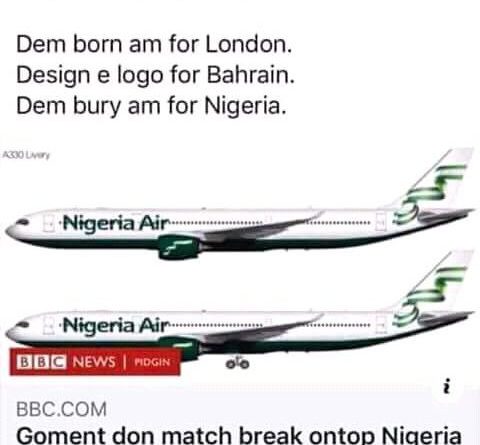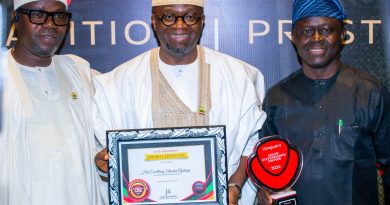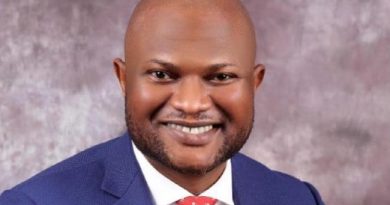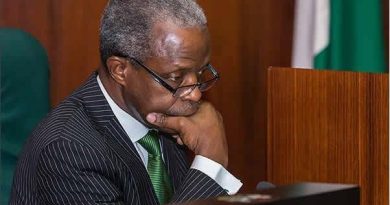Nigeria Air Revs On Excess Budget, Doubtful Partnership Model
.Only Ethiopia Airlines bid for the new national carrier
• How 49% ownership, controlled by foreign interest will rob Nigeria of BASA routes
• Stakeholders: It is another private interest masquerading as the national carrier
• Project to mimic Virgin Nigeria’s mistake
Barring any change in plans, Nigeria will have a new national carrier in December, though there are still concerns about its planned operating model and choice of technical partner.
The new airline, already christened Nigeria Air, will begin domestic flight operations with three aircraft, leased from Ethiopia Airlines (ET), and operated by Ethiopian pilots and crew.
A top official in the Ministry of Aviation said the working partnership between Nigeria and ET to kick-start “the best national carrier Nigeria has ever seen” was already at an advanced stage.
Aviation stakeholders, however, shared none of such optimism. Yesterday, they lamented the project’s lack of transparency on funding and the real owners, wrong choice of partnership with a competitor that allegedly has “aviation colonialism” as its continental agenda, as well as zero consideration for local operators and national interest.
The arrowhead of the project and Minister of Aviation, Hadi Sirika, had last month announced that Nigeria Air was on its way to reality following the completion of a three-month-long Request for Proposal (RFP) under the Public Private Partnership (PPP) Act and a painstaking selection process.
Sirika said: “After a careful, detailed and Infrastructure Concession Regulatory Commission (ICRC)-governed selection process, ET Consortium has been selected as the preferred bidder, offering an owner consortium of three Nigerian investors: MRS (46 per cent), FGN owning five per cent and ET 49 per cent, being the dominant stake.”
Aviation Ministry sources, however, confirmed that Ethiopia Airlines was the sole bidder that showed interest in the new carrier within the three-month bidding frame. The Guardian earlier reported the project as a hard sell to international investors, especially, at a time of global economic crunch.
ET, being the dominant largest fleet airline on the African continent, already has similar partnerships and share capital in the aviation sector of seven African countries – Chad, Togo, Cote d’Ivoire, Zambia, Malawi, Guinea, Mozambique and DR Congo.
And to start up in Nigeria, ET is expected to deploy three Boeing 737-800 on domestic routes with Ethiopian crew, contrary to earlier approval by the Federal Executive Council (FEC) to dry lease three aircraft that would be flown by Nigerian pilots, and crew and create jobs.
Stakeholders, at an Aviation Town Hall Meeting, hosted by Avaero Capital, yesterday, described the skewed partnership as oddly familiar, targeted at Nigerian long-term interest and should be aborted.
Secretary General of Aviation Safety Round Table Initiative (ASRTI), a think-tank group of local aviation, Group Capt. John Ojikutu described the national carrier project as “an adulterated wine in an old skin.”
Ojikutu reflected that the problem of packaging a government-owned airline under a national carrier toga started with the military era. Unfortunately, he said, the current model of partnership with ET, is not any different from the then Nigeria Airways failed partnership with British Airways and South African Airways, and also, the making of failed Virgin Nigeria.
Now, we are repeating the same mistakes of bringing in our competitors into our own Bilateral Air Service Agreements (BASAs). It will not work or give us any advantage. I had followed the plan to establish the new national carrier until it dawned on me in November 2019 that we are going the way of establishing a government carrier,” Ojikutu said.
In place of a “government-owned” carrier, he advocated two flag carriers from local operators, to service both the continent and beyond. He said Nigeria should ideally look for foreign technical partners to support the two flag carriers, but they should come from places like Canada and Australia that have no competing interests with Nigeria on the BASA routes.
Ojikutu’s worry is not unconnected with the BASA rules that were invoked against Virgin Nigeria’s (VN) operations that prevented it from flying Nigerians to the United States. Since the British carrier, Virgin Atlantic (VA), owned the dominant stake in VN, its (VN) Lagos-U.S. operations were seen as VA attempting to gain entry into the U.S. through the back door.
“We are now making the same mistake by giving the dominant ownership and control to a foreign airline. We are going to have a lot of problems flying internationally with ET’s operations and control. Also, we have already given ET four destinations in Nigeria. Are we going to stop that or our national carrier will be competing with it and sharing the earnings at our four international airports? It will not work,” Ojikutu said.
Chairman of West Link Airlines Limited, Capt. Ibrahim Mshelia, reckoned that a new national carrier was meant to be a good idea for the country, which he also advocated at the beginning of this administration.
However, “in so far there is a hidden interest and lack of transparency as we have seen, this project is bound to suffer, and add more to our problems.”
Mshelia said the Federal Government should re-concentrate efforts on addressing local issues and work transparently within the industry and for Nigerian interest.
He said: “There is no way ET will set up a Nigerian carrier that will be in competition with itself. I had expected that the new national carrier would have some of our local carriers as its partners. I expected to see an airline like Air Peace owning a 25 per cent stake. But what we are seeing is ministry staff at the forefront of the project. Who are they representing? We don’t know, but we need to know the real owners of Nigeria Air. This is just another airline.
“For me, the national carrier project is a good one. But we should also take the local aviation bull by the horn by reducing the burden of local operations to make the business environment better and be able to have competitive tickets in the region. Our tickets are more expensive in the region because we pay too many taxes and charges here.
“If we want to have robust aviation, we must also follow global best practices. Foreign airlines get their funding at 1.5 to three per cent interest rates and spread over 25 years. Until we can do that by way of support for local airlines, we would keep having problems and complaining that local airlines cannot compete,” Mshelia said.
Former Managing Director of Nigerian Airspace Management Agency (NAMA), Capt. Roland Iyayi added that the idea of a new national carrier, after the defunct Nigeria Airways, appeared promising at a time the African continent was walking the tightrope of a Single African Air Transport Market (SAATM).
Iyayi said while it was expected that the Nigerian government would support and prepare indigenous carriers to optimise both local and continental potential, the aviation handlers had chosen to give away the sector to Ethiopians
He said to accord unfettered access to a co-competitor in the name of technical partnership “smirks of deceit and the entire process opaque, with no strategic sense in it.”
Iyayi, who is the CEO of Top Brass Aviation, said the ET partnership would totally decimate the domestic carriers.
“The moment you enter into the partnership, you are encouraging cabotage. What they will want to do is to penetrate the local market by lowering fares to fight domestic carriers. Once the local operators have failed, they will have a monopoly, which is not a welcome development for the consumer.
“I expected the government to have studied Vision 2025, now 2035 of ET. What they have done in anticipation of SAATM is to dominate the African market, which should be our primary objective too. We have a market that no one else has on the continent. ET has partnerships in eight other countries in Africa. Now they have 135 planes. They have also said that they will increase the fleet size to 250 within the next five years, to go into all the domestic markets that they have footprints in. Nigeria, now inclusive.
“What they are trying to do has been called aviation colonialism of Africa. Is it that our government is not in the market to see all of this and understand the clear strategy? Since we are going to borrow three airplanes that are surplus to their requirements, are we not going back to the Virgin Nigeria experience? It was clear that Virgin Nigeria was Virgin Atlantic by proxy.”
On funding the project, The Guardian earlier reported that the project has racked up appropriation votes of N14.65 billion from 2019 to 2022. The Minister recently denied the figures, saying only N400 million had been approved thus far.
Though the government plans to own only a five per cent stake, another estimate showed that the government proposed N7.45 billion for the national carrier in the last three years.
For 2023, the government is proposing N1.3 billion, with N700 million as ‘working capital’ and N200 million as a consultancy fee.
Principal Manager, of Avaero Capital Partners, Sindy Foster, said it is odd that a service provider would enter into a partnership with the government to compete with their customers.
“I don’t know in which country that is allowed. You cannot be buying shares in other airlines and potentially put your customers at a disadvantage, who have been loyal for many years. We understand the need for a national carrier, but the way it is being carried out leaves the local airlines at a disadvantage deliberately.
“Local airlines have been suffering for a long time. The government is only fixing the runway at the 11th hour. We are having forex and aviation fuel issues that are not being addressed. If you are already part of their problem, then you should not be entering into an agreement with another airline. That is not a level playing field,” Foster said.
Chairman of the United Nigeria Airline (UNA), Dr Obiora Okonkwo, also agreed that the project is reminiscent of another policy flip-flop by the government that on one hand encourages local investors to come into aviation, and on the other hand allows much latitude to foreign interests to kill local businesses.
Okonkwo, who is also the spokesperson of the Airlines Operators of Nigeria (AON), said the popular narrative of the ministry is to demonise the local operators that they cannot justify why Nigeria needs national carrier and foreign technical support.
“But that is not true. How much support did these local airlines get from the government to be able to compete and emerge strong? That we have survived without government support is a credit to our resilience and we should be commended. I think the national carrier design of wet leasing three aircraft is an insult to Nigeria and our local operators. A new national carrier should be talking of 10 to 20 brand new aircraft orders, while local carriers are already placing orders for 30. Not doing that is a shame.
“I see a lack of genuine interest in the agenda. Mr President is probably supporting the project because he was told that Nigeria will not be putting a dime into it. But no one is talking about what Nigeria will be losing. What we will lose is the private sector investments in aviation. We have not seen anything Nigerian in this plan and it should not be allowed to fly,” Okonkwo said.
TheGuardian




